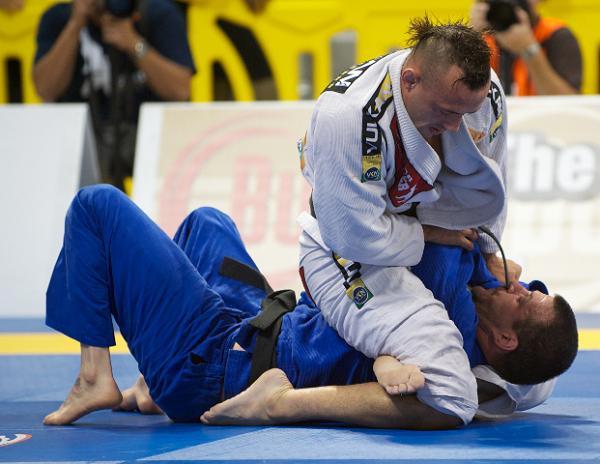
Abmar Barbosa in action at 2010 Worlds: not a sure-thing for 2012 yet / Photo: John Lamonica/GRACIEMAG.com
Middleweight competitor Abmar Barbosa appeared to be making a dash for the top of the ranks of sport Jiu-Jitsu. He was a finalist at the 2010 Pan, won the Asian Open and the Honolulu Open on the same year. Starting last year, though, this native of Rio Claro, a town in São Paulo State, and black belt under Robert Drysdale got mired in a string of back-to-back injuries. What does a professional Jiu-Jitsu player do while recovering? What lessons does the champ have to teach us about motivation, physiotherapy and the art of not give up on training? Abmar Barbosa fills us in.
What was this spate of injuries like, Abmar?
Well, last year I injured my pubis, the exact same injury Guga [Gustavo] Kuerten suffered in tennis. I made a full recovery, returned to training three times a day and was feeling fine, but I had to stop for three months last year to do intensive physiotherapy to avoid aggravating the problem. This year I returned to competition, managed to place third at the Abu Dhabi Trials and even entered the Pan, where I didn’t do too well. I was training for and focused on competing at the Worlds but, and I don’t even know how, I had to stop to get an appendectomy.
How are your body and mind doing? What have you been up to?
Now it’s been four weeks since the operation, but I’m back to training normally. I feel really great and, even though I’m not 100% yet, I can compete at the Worlds and come up with a good result. I’m still not sure if I’m going to compete, though, because being four weeks post-op I can’t yet exert much force—imagine the force I’d have to exert at a Jiu-Jitsu World Championship. I feel the toughest part right now is minding the injury, the recovery. If you spend your whole day at the academy, it’s almost not humanly possible to watch everyone training and not train yourself. In my case, what helped me was to distract myself with a different activity. I decided to take a three-month helicopter piloting course here in the USA. That will keep my body and mind busy for three months and only leave me time to get tempted by Jiu-Jitsu at night. I feel that this way I’ll make a 100% recovery.
(Watch Ambar in action at the NY leg of the Abu Dhabi WPJJC tryouts.)
Did you think of quitting?
Truth is, a movie went running through my head. I did think about quitting, since I’d never been injured to the point of not competing before—and that’s over ten years doing Jiu-Jitsu. All this was new to me. But I got my head on straight, since as they say, every great athlete always has a great injury. It’s not that I’m a great athlete or anything, but I try to be. These days I don’t see quitting Jiu-Jitsu as being possible anymore. And the more everybody thinks I won’t be back as good as I was, the more strength it gives me to return.
What about your students, how are they?
At least I made the most of the time out of competition to train my students better. I paid a lot of attention to them, and I also helped Joe Louzan train for the UFC—he’ll be fighting on August 4 [probably against Terry Etim, at UFC on Fox 4).
* This article was the suggestion of a reader of ours on our Facebook page. Get on and send us in any ideas for articles or interviews you might have!
The post How do you occupy your mind and body when injured in Jiu-Jitsu? first appeared on Graciemag.